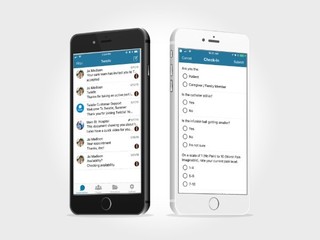
(Note: Vator will be holding its latest healthcare salon, called The Future of Health Insurance, on Nov. 14. Get tickets here!)

(Note: Vator will be holding its latest healthcare salon, called The Future of Health Insurance, on Nov. 14. Get tickets here!)
People, frankly, don't understand health insurance. A survey conducted by PolicyGenius last year found that the majority of people don't understand the terms "deductible," "coinsurance," "co-pay," or "out-of-pocket maximum." Only four percent could define all four terms. Basically, people need help guiding their way through their own benefits and plans.
Enter Sensely, an artificial intelligence and chatbot company, whose platform helps guide members to insurance services and healthcare resources.
From hospitals to insurance
Founded in 2013, the company began its life by mostly working with hospitals and healthcare providers, but, as it began to grow, "what we discovered was that the people who really use the product, and the companies who are incentivized to use the product, are really insurance companies, particularly health insurance companies," Adam Odessky, CEO and Co-founder of Sensely, explained to be in an interview.
The reason, he said, is that the insurance companies "have a much bigger reach in terms of the populations they can cover, and also they have an incentive to reduce risk and costs by navigating people to their best place of care, depending on their network, depending on what sorts of services they provide to their members."
"Insurance companies have slightly more unique requirements than hospitals do, so, for instance, people who communicate with insurance companies talk about things beyond healthcare, like how to pay your bills or filing claims or getting to customer service. So, as we expand our product, and the content that is supported by these conversations that we have with patients and members, we’re adding more insurance-type use cases. So, that’s where the product is naturally going."
Sensely is still working with hospitals, but insurance companies are a better fit and have now become the company's primary customers.
While Odessky wouldn't say how many insurance companies Sensely is currently working with, he did tell me the names of a few of its partners: the National Health Service in the UK, Houston Methodist, the Mayo Clinic, Nippon Life Insurance, which is largest life insurance in Japan, and Aflak. Earlier this year, the company also partnered with Rakuten Life Insurance. It is currently reaching a couple of million patients around the world.
A new round of funding
A few of those partners were also the investors in Sensely's new $15 million funding round, which it announced earlier this week.
The round was led by Aflac Corporate Ventures, the venture arm of Aflac, along with new investors include NMC, a diversified healthcare company with international services across 19 countries, as well as Nippon Life Insurance Company, Susquehanna International Group, Sojitz Corporation, Zuellig Pharma, and Silicon Valley Bank. Existing investors Mojo Partners, Chengwei Capital, and Pegasus Tech Ventures, also participated. This round brings the company's total funding to $26.8 million.
These investors, which include participation from strategic investors in insurance, hospital systems, and pharmaceuticals, all of Sensely's target markets, represent potential partnerships, said Odessky.
"A lot of those partnerships are focused on member engagement. So, these companies are basically bringing a suite of member health engagement services to their membership base and these are services that Sensely already provides, like symptom checking and administration services management and self care, wellness," he told me.
What Sensely offers
Sensely offers its customers services through what is calls a “unique brand ambassador,” or an avatar that the customer an design and customize for their consumer-facing chatbot.
The customer choose the face that they want, whether it’s male or female, so if they have an actor that they work with, or if they have an image of a type of person or character that they want, they choose that face. They can also choose from 32 different speaking languages, and they can dress their avatar in whatever they want, be it brand colors or their logo. Finally, they are able to name their specific bot.
"One of the reasons why companies choose to go with us is because they basically design a character to represent their brand in the front door to their partnerships service offering," explained Odessky.
"Sometimes pharmaceutical companies like to give a name to these avatars that are similar to their drug brand. Sometimes the companies themselves want to create a new character, or use an existing character that is representative of the brand."
Through the use of its chatbots, Sensely has been able to take customers from higher cost services and unnecessary services, like emergency rooms, down to lower cost services, like telemedicine and doctor’s appointments, by about 14 percent. It has also been able to reduce readmissions for 30 days back to the hospital for congestive heart failure by 75 percent.
Finally, it has also been able to improve disclosure rates, meaning make patients more honest about diseases they have, as well as if they drink and smoke, by about 250 percent compared to talking to somebody on the phone.
The company actually ran a study with one of its insurance partners, in which it asked people the same questions through a chatbot that it asked them on the phone.
"They compared it apples to apples, side by side, to the actual prevalence rates of these diseases in the region where these people are based, and, on average, the disclosure rates for the diseases and health risks was about 2.5 times more for people using Sensely, over the people talking to the underwriter on the phone," said Odessky.
"That being said, the prevalence rates were still much higher than the disclosed rates. So more people have these risks than they disclosed. Our premise on that is everybody lies, but with Sensely they lie less."
Part of that does have to do with people feeling less judged when talking to a computer, but Sensely also uses language that assures members that their information is going to be secure to help put them at ease.
Sensely's future
Now that it has raised this new funding, Sensely plans to allocate it in three ways; the first is to build out the product, meaning making the virtual assistants more intelligent and broader in terms of the types of services and things they can talk about. That will require more heavily investing in artificial intelligence technologies and big data.
"We’ve done pretty well in the health services, the symptom checking, the chronic care management, there’s always more work to do in adding additional symptoms that we don’t have today. And following up with people for longer periods of time, not just a couple of months when they’re in a facility but longer, one or two more years. That’s what we'll do on deepening the current health services that we have," said Odessky.
"On the breadth side, it’s about adding additional payer and medication management services. So, the ability to answer a question about how much a policy costs, be able to find the right doctor or hospital, to be able to connect to customer service, to be able to pay your bill. Any of those kinds of customer service types of interactions that an organization needs, our bot will able to address in a very accessible, front door sort of way."
The funding will also go toward expanding internationally, including in emerging economies in places in East Asia, such as China, Hong Kong, Philippines and Thailand, where "there are many people there buying insurance, getting health insurance for the first time."
"We also have areas, particularly in Eastern Europe, that are expanding insurance quite a bit. And we have some traditional areas that are already pretty well set up, but they need new member engagement services to enable retention and enable buying larger policies. So, we see the U.K., Japan being the more mature markets that we play in, along with the U.S. And then we see China and Middle Eastern growth countries, as well as Southeast Asia, playing more in our market strategy."
Finally, that expansion will also mean building out the team, growing the company from 35 employees today to between 80 and 100 over the next couple of years. The company plans to add more customer success people, more sales people, and more support.
As fast as Sensely is growing, though, Odessky is quick to point out how early we really are in deploying these technologies, and how far we still have to go.
"Right now we’re scratching the surface a bit. There’s millions of different diseases that are out there, and a million different workflows and tasks that chatbots could actually help with and do it in a very functional, efficient and friendly manner, to get people results quickly and help people get back on their feet, get cured much quicker and with a better experience," he said.
Startup/Business
Joined Vator on
Sensely’s avatar and chatbot-based platforms assist insurance plan members and patients with the insurance services and healthcare resources they need, when they need it. With offices in London and San Francisco, Sensely’s global teams provide virtual assistant solutions to insurance companies, pharmaceutical clients, and hospital systems worldwide.

Joined Vator on





